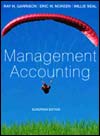

 Management Accounting Strategic management accounting and the Balanced Score Card Self-test Questions |

 2003 A McGraw-Hill Online Learning Centre
2003 A McGraw-Hill Online Learning CentreAny use is subject to the Terms of Use and Privacy Policy.
McGraw-Hill Education Europe is one of the many fine businesses of The McGraw-Hill Companies.